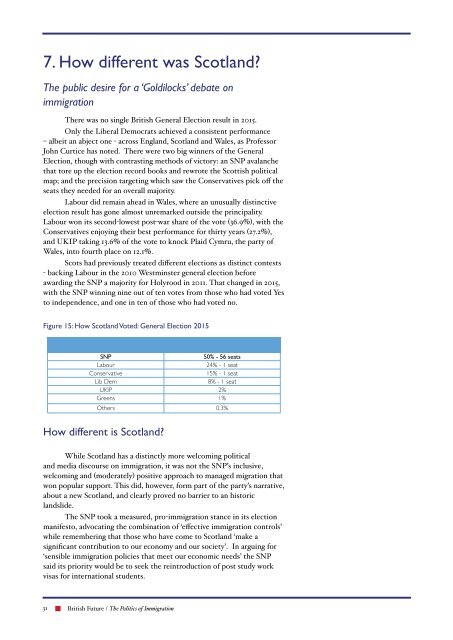THE POLITICS OF IMMIGRATION
The-politics-of-immigration
The-politics-of-immigration
You also want an ePaper? Increase the reach of your titles
YUMPU automatically turns print PDFs into web optimized ePapers that Google loves.
7. How different was Scotland?<br />
The public desire for a ‘Goldilocks’ debate on<br />
immigration<br />
There was no single British General Election result in 2015.<br />
Only the Liberal Democrats achieved a consistent performance<br />
– albeit an abject one - across England, Scotland and Wales, as Professor<br />
John Curtice has noted. There were two big winners of the General<br />
Election, though with contrasting methods of victory: an SNP avalanche<br />
that tore up the election record books and rewrote the Scottish political<br />
map; and the precision targeting which saw the Conservatives pick off the<br />
seats they needed for an overall majority.<br />
Labour did remain ahead in Wales, where an unusually distinctive<br />
election result has gone almost unremarked outside the principality.<br />
Labour won its second-lowest post-war share of the vote (36.9%), with the<br />
Conservatives enjoying their best performance for thirty years (27.2%),<br />
and UKIP taking 13.6% of the vote to knock Plaid Cymru, the party of<br />
Wales, into fourth place on 12.1%.<br />
Scots had previously treated different elections as distinct contests<br />
- backing Labour in the 2010 Westminster general election before<br />
awarding the SNP a majority for Holyrood in 2011. That changed in 2015,<br />
with the SNP winning nine out of ten votes from those who had voted Yes<br />
to independence, and one in ten of those who had voted no.<br />
Figure 15: How Scotland Voted: General Election 2015<br />
SNP<br />
50% - 56 seats<br />
Labour<br />
24% - 1 seat<br />
Conservative<br />
15% - 1 seat<br />
Lib Dem<br />
8% - 1 seat<br />
UKIP 2%<br />
Greens 1%<br />
Others 0.3%<br />
How different is Scotland?<br />
While Scotland has a distinctly more welcoming political<br />
and media discourse on immigration, it was not the SNP’s inclusive,<br />
welcoming and (moderately) positive approach to managed migration that<br />
won popular support. This did, however, form part of the party’s narrative,<br />
about a new Scotland, and clearly proved no barrier to an historic<br />
landslide.<br />
The SNP took a measured, pro-immigration stance in its election<br />
manifesto, advocating the combination of ‘effective immigration controls’<br />
while remembering that those who have come to Scotland ‘make a<br />
significant contribution to our economy and our society’. In arguing for<br />
‘sensible immigration policies that meet our economic needs’ the SNP<br />
said its priority would be to seek the reintroduction of post study work<br />
visas for international students.<br />
31 British Future / The Politics of Immigration


